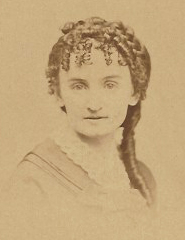
“Horrible!” wrote Sallie Knott on April 15, 1865. The previous evening in Washington, D.C, President Abraham Lincoln had been shot at Ford’s Theater and Secretary of State William H. Seward stabbed by unknown assailants. At home in Lebanon, Kentucky, Sallie sat down to record her reactions in her journal. But it wasn’t easy to sort out her thoughts, for at the outbreak of the Civil War she had made one thing clear to that same journal: “I glory in the name of Rebel.”
As a young schoolteacher in Bowling Green, Kentucky, Sallie had developed a disdain for Northern attacks on her state’s way of life. Her anti-Yankee sentiments grew after she married her cousin James Proctor Knott in 1858 and moved to Missouri, where he was a lawyer and state legislator. In 1861 Knott, now Attorney General of Missouri, was stripped of his office for declining to take an oath not to “aid the Southern cause,” and the couple was forced to return to Kentucky.

For the next four years, Sallie remained largely true to her promise to confine her journal entries to personal affairs, but the news from Washington demanded comment. Sallie could not restrain her sense of triumph. “Just retribution! but how awful!” she declared. Lincoln had proclaimed the previous day “a universal Thanksgiving day,” but “while his partisans were feasting & making merry, by his own order, over the misfortunes of a brave & oppressed people, he & his chief director & adviser in all his fiendish schemes, are dying! Lord, thou art just & holy; & thy judgements infinitely surpass our desires or comprehension.”
Her thoughts then turned to the identity of the perpetrators. Of course, fingers pointed to Southerners as “the prime movers in the plot,” but Sallie put her money on General Ulysses S. Grant who, “with the army at his back, is going to try to make himself sovereign & absolute!” Grant had accepted Lincoln’s invitation to attend the play at Ford’s Theater, she noted, but then backed out and left town. And like Americans who, after President Kennedy’s assassination, rejected the “lone gunman” theory, she saw conspiracies in the shadows. “Why,” she asked, “was there no attempt to arrest either assassin by guards, servants, police, nor a theatre full of people?”
Would “a terrible struggle for absolute power & the rights of the people” now ensue, with the army on the side of despotism”? Sallie wondered. “ Let us be still & see!” In the meantime, she had to hold her tongue around grieving family and friends and at her church’s memorial for the martryed president. “No heathen Juggernaut ever received so much devotion as we have been obliged to offer at the shrine of Abe Linkhorn’s dead, ugly old phiz!” she sputtered. “Bah! ‘tis perfectly sickening!”
Sallie McElroy’s journal is part of the holdings of the Manuscripts & Folklife Archives of WKU’s Department of Library Special Collections. Click here for a finding aid. Search all our collections through TopSCHOLAR or KenCat.
